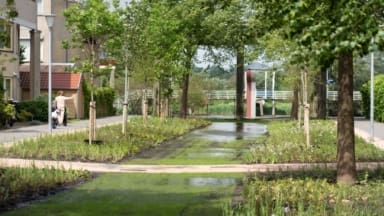
The Green Cities Europe Award aims to generate awareness of the negative effects of climate change on urban locations amongst key professionals in city planning and landscape planning, and champion sustainable initiatives, along with generating investment for urban greening projects.
The awards are organised by the European Nurserystock Association (ENA) and nursery organisations in 13 European countries that support Green Cities Europe. Thirteen European countries work together in the program, aiming to highlight the added value of green space in the urban environment.
According to the organisers, even though, national and regional governments and local councils are aware of the dangers of climate change, there is often not enough accessible knowledge and scientific backing available to convince decision-makers of effective climate mitigation strategies in cities. This is especially key, concerning the development of new housing projects and improving living conditions in existing cities. In the UK, the government has pledged to build 1.5 million new homes with little to no impetus for equated numbers of gardens and green spaces, which would be beneficial for the environment, biodiversity, human health and wellbeing.
In the middle of the current century, 70% of the world’s population will be living in urban areas. Around 2050 the negative consequences of climate change on living conditions will be substantial, due to higher temperatures, more frequent and excessive rainfall with consequential flooding, more widespread and excessive drought etc. Research shows that public green space has a positive effect on biodiversity, climate, wellness and air quality – which could ensure that cities can become better places to live and work. The Green Cities Europe platform aims to encourage the greening of public spaces by providing innovative ideas, information based on scientific research, and technical expertise. Its activities address the key themes of health, climate, the economy, biodiversity and social cohesion.
Ten urban projects have been nominated for the 2024 Green Cities Europe Award, which are located in the Netherlands, Sweden, Hungary, Belgium, Italy, Poland, France, Bulgaria, Denmark and Germany. Judged by an international jury, the winning project will be revealed at the IPM Conference in Essen in January 2025.
One of the nominated projects, is the ‘Green-blue’ project in the Hans de Riesstraat, Alkmaar in the Netherlands. A small project, but with potential applications far and wide. A neighbourhood project, it features several innovative solutions, such as downpipes and street gullies that can be disconnected from the sewer system to reduce pressure on the sewers, but also to provide vital water for the plants, trees and landscaped green spaces. More than 1.500 m2 of paving was replaced with native planting and wildflowers, along with a total of 33 tree, of varied species, such as oak, elm, lime and maple. Residents are very much involved in the greening of their street, choice of plants and have even adopted plants, which are in their personal care. The landscaping features, urban meadows (native wildflowers), a planted grass wadi to soak up excess rain, vibrant verges and communal pond with planting. According to the project organisers, economically speaking, research proves that investing in green spaces makes financial sense.
“People naturally become happy when seeing greenery. It’s in their DNA. Happy people are healthy people, so less sick both physically and mentally. This project applied the now familiar 3-30-300 rule by planting additional trees. The air is purified by the trees and the green landscaping invites residents to spend more time outside. The green landscaping connects the neighborhood to the natural area on the city borders. Houses in a green neighborhood have more value, therefor the municipality receives more taxes. Flooding and extreme heat will be countered with the new green-blue design,” explained a spokesperson for the Alkmaar project.

